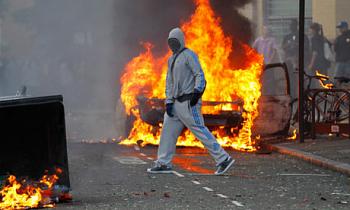Britain's riots are the fruits of anti-human austerity
Those of us who have been involved in the anti-cuts campaigns in London over the last eighteen months have been predicting the rise of social unrest in the capital as a consequence of the government’s austerity measures. This is not because we welcome the rise of unrest and violence, but because we understood the withdrawal of services and state provision for the young, unemployed, and vulnerable would be a disaster for the people relying on them.
London over the last year has seen the effects of recession. It has become an edgier city with the spectacle of great wealth contrasting so visibly with the rise of more poverty and joblessness. But it has also seen the rise of a highly visible student protest movement and trade union and community action against government cuts.
As the coalition government, headed by the Conservatives, went ahead and slashed the budgets of local governments and set in place the most drastic cuts to social services in fifty years, the predictions of social commentators and budget analysts was that the effect upon the young in London and in the UK more generally would be highly detrimental.
When the prime minister addressed the press from Downing Street he adopted the moral rhetoric of condemnation as well as the language of outrage used in the response to terror attacks and atrocities. Talk of the mindlessness of violence and criminality is everywhere in the press today.
But Conservative politicians specialize in the language of moral outrage and the dissemination of a simplistic understanding of the causes of social dislocation. This is not only because their underlying philosophy ignores the effects of class and inequality of human behavior, but because the policies they enact will always have the effect of exacerbating social conflicts.
As so many have pointed out, the last waves of major social unrest in London in the eighties contained the same elements of political and social breakdown.
Gang crime and violence, racial tension, and social unrest are complex and ugly phenomena, embedded in London’s history and daily life. The riots of the eighties arose in the context of police brutality towards non-white communities already facing economic deprivation exacerbated by the recession. But in the case of the recent riots history repeats itself – because the same structural forces return to produce the same social effects.
The history of the last three or four decades of British society has seen a rise of youth violence and crime, with gangs and knife and gun use all increasing in number and frequency, especially in the capital. The fusion of race, class and economic deprivation with corrupt policing created a toxic environment in which young men from poorer backgrounds struggled to succeed in school or find employment.
The projects and social services New Labour put in place were attempts to deal with these rising issues of crime and ‘anti-social behaviour’ from young demographics in cities. While the New Labour government in many ways represented the defeat of the labour movement and the mainstream left in this country, coming on the heels of the success of Thatcherism in crippling the unions and the progressive ideals of the post-war settlement.
Yet the politicians of New Labour had done their reading and knew their sociology, even if their pronouncements on economic inequality and class were deeply centrist and at times conservative in social attitudes. Funding for schemes like the Educational Maintenance Allowance, provision of social housing, child benefits, youth centres and nursery provision were welfare mechanisms which recognized how economic deprivation was a fundamental cause of crime, delinquency, and social breakdown of communities.
But as is the case for many welfare programmes and social policies, particularly when they are not accompanied by ideas of entitlement and economic rights, they did not deal with the underlying causes of youth crime and violence, and papered over the cracks of an increasingly unequal society in Britain. A growing gap between the wealthiest and the rest, stagnant and declining wages, and long term unemployment, all returned as major issues.
Equally New Labour politicians, for both electoral and moral reasons, had bought into the theories of the New Right that welfare had acted as a negative influence on the moral fiber of young people and families, encouraging dependency on the state and reducing the impetus for self-improvement and responsibility. The welfare schemes politicians instituted were not given as rights or entitlements for individuals struggling to cope with the inequities of the free market. Instead schemes were targeted in a technocratic and managerial style, and were meant to encourage greater economic efficiency and labour market participation whilst identifying frauds and welfare dependents who were cheating the system.
In the eighties, at a time of recession and unemployment, the politics and economics of Conservative governments under Thatcher acted as crucial constituents for the type of social chaos which unfolded on the streets of London. Today we see the same constituents, with the difference that the cuts which have been made to welfare and social provision from the government were only dreamt of in Thatcher’s imagination.
Like many Conservatives David Cameron styles himself a pragmatist. But conservative politicians are fundamentally moralists. Their answer has continually been that the state’s provision of welfare is not only a fiscal burden but has led to the creation of a welfare dependent, morally feckless, underclass of single mothers, young black men without fathers, delinquent hooligans, and long term unemployed.
The strong lineage of moralism and paternalism inherent in the class of old Etonians, presently in government, focuses on the undeserving and freeloading poor, those habitually taking advantage of state provision. Many of the arguments that Conservatives such as Cameron and Osborne provide to justify cuts are not new. And they have used the fiscal crisis of public debt to push through fundamental changes to the state’s social provision on the basis of moral and ideological convictions.
Their arguments are the same Victorian arguments featured in the nineteenth and early twentieth century debates on welfare reform. Poverty and low economic standing are seen as fundamentally individual responsibilities, and the state’s involvement only adds to moral degeneration. This is the consistent discourse Conservative politicians have brought to British politics over the last three or four decades with hugely negative results.
Their moral arguments are part of a simplistic understanding of poverty and its causes consistent with the Conservatives' history. But it is also highly attractive to the media and the conservative strains of British public opinion because it allows for outrage and moral speeches but no discussion of the causes of violence and disturbing images of social chaos.
Tony Blair once remarked in his turn as Conservative Prime Minister in a Labour government that the young had lost their way and that the 1960s youth rebellion and permissive society had paved the way for moral abandonment and rebellion against social norms. Since the beginnings of greater freedom for the young in this country there has been a systematic attempt to portray youth culture especially in its more aggressive and violent forms as empty of any coherent content and motivation but rather as purely irrational, destructive, and aimless.
The young are like the rest of society’s individuals, products of their environments and life chances. The fact that some can behave in violent and aggressive ways, that they can loot and arson, and wreak havoc, is shocking. But it is less shocking than the spectacle of a society which has allowed itself to become so deeply unequal again and to have neglected the social problems of poverty and social immobility that violence becomes the resort of the frustrated and angry.
For those who have committed violence in the last few days, they have grown up in a world of diminishing life chances and frustrated desires. For those young men and women who have seen their chances for higher education diminish, with the passing of recent legislation and the rise in unemployment, they have grown up in a city where extremes of wealth are clearly visible.
The wealthier boroughs of London, and the finance-based City, are a testament to the huge polarities of wealth in the UK today. The consumer society in which the young from the 1960s were encouraged to measure themselves by the goods that they bought and owned, has become the governing constituent of many young people’s social reality. Youth culture is obsessed with the ownership of brands and luxuries which bestow identity and status. That the deprived and disadvantaged loot and steal the possessions they covet should be no surprise in a society where material acquisition is the aim but the means to achieve them are so seriously out of reach.
With statistics of 20 percent youth unemployment in London, and the diminishing number of young people able to achieve places in training, jobs, or higher education, as well as the cutting of social programmes and centres for the young, the rise of violence and disorder is a consequence of Conservative cuts. It is also a testament to the futility of the Conservative vision of the 'Big Society'. State provision has filled the gap for the failures of the market to provide opportunity and sustenance for the most disadvantaged. Its removal has been a disaster for many families, dependent upon these services for their livelihoods and participation in jobs and education.
To argue for these explanations is not to celebrate them or to provide a moral justification. Such discussion is pointless as it suggests that we all live in the same reality. It also countenances the idea of a natural evil to the human condition which accounts for human violence and defiance of social norms. This is a peculiarly conservative shibboleth going back to the reactions of British politicians to the French Revolution and the rise of social protest.
The type of violence we have seen in London has been shocking and deeply regrettable, especially for those who have been affected in their homes and workplaces. Yet its causes lie at the heart of a longer history of the neglect of economic opportunity for the masses and of sustainable and just investment in public services and social and economic rights.
To dismiss the serious violence and chaos as mindless and purely criminal is to ignore its context. It is also to give into this argument which has gained great sway in Europe and America, that state action to create jobs and expand support for the unemployed and vulnerable, cannot help economic growth. For all those who deny the comparisons with Greece, welcome to the fruits of austerity.
internet site reference: http://www.zcommunications.org/these-riots-are-the-fruits-of-austerity-by-emma-gallwey
Comments
There are 0 comments on this post















